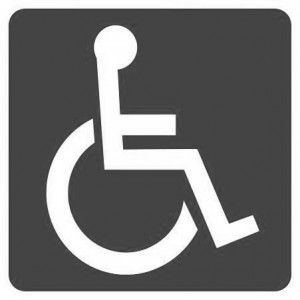Disabled People Suffer
There was a sad article the other day in Eurasianet about problems faced by disabled in Kyrgyzstan. I post it here because unfortunately many of the same problems exist in Kazakhstan. After doing a bit of research on the subject, I see there’s still a lot of work to be done to integrate disabled people into society. First of all, there is the fact that the word in Russian for disabled is invalid, a word that has gone out of fashion in the West with its implications of being not normal.
But more seriously, disabled children are not normally sent to school. In fact I have yet to a see a school equipped for a physically disabled person. Every school has stairs to the front entrance and narrow stairs to each floor. A kid in a wheelchair would be helpless. Teachers are not trained in any way to deal with disabled children or children with learning disabilities. So they are either sent away to special boarding schools or have tutors come to their houses.
But it’s not only school. Soviet standards dictated that houses with five or less floors didn’t need elevators. So many buildings don’t have them. Or if they do, the entrance is up a flight of stairs. So many physically handicapped people can’t even leave their homes. Sidewalks in Almaty even have stairs on them. You may have seen ramps in the sidewalks with little steps in the middle and though those were for a wheelchair. You were wrong; those are for handcarts! Even the Ministry of Social Protection makes people in wheelchairs go in through the garage!
I’ve been talking a lot about people with physical handicaps because those accommodations (elevators, ramps, ground floor entrances) are most noticeably absent. However parents and teachers are not taught coping mechanisms for dealing with physical or mental handicaps. While I’m sure that doctors and social workers try, there isn’t any kind of institutional support for teaching enabling strategies, outside of a few NGOs (I understand there is such an NGO in Almaty that does work with the disabled and their family to work with the handicap and integrate people into society).
What there is, are special companies that employ the handicapped. These companies have special status in winning government contracts. Apparently the sheets on the trains are made by the handicapped as well as some school uniforms! However, these companies tend to be only factories that don’t pay higher wages or give any better benefits to their workers. So basically the only jobs open to the handicapped are minimum wage, industrial work at a factory machine!
Unfortunately, the usual pattern appears to be that if a family gives birth to a disabled child or someone in the family is injured seriously in an accident, Mom or Dad will have to quit their job to stay home and be a caretaker. They receive an inadequately small allowance from the government. But invalids are left at home, badly educated and lacking job skills. Or the opportunity to physically go to a job. In fact, after the age of eighteen, disabled people can be sent to state nursing homes! So a family that can’t or doesn’t want to take care of their disabled son or daughter can send him or her to live with abandoned pensioners from the age of 18!
The picture seems pretty bleak and I would love to hear in the comments that I am wrong and that there are stories of hope for the handicapped.










nice article, this problem exists in Russia as well. BBC world recently did a piece on disability in Russia and gave an example of a guy in a wheelchair who was beaten up by yobs for being, well, disabled. He then equipped himself (quite understandably) with a huge array of security and surveilance devices in his small one room flat to protect him in the future and he barely leaves the house.
Having been in Kazakhstan for 4 years now, I can honestly say I’ve never seen a single wheelchair. The only disabled (i.e. physical disabilities) people I’ve seen have been beggars who sometimes have missing limbs. I guess the others are left at home, unable to venture out. I saw a guy about a month ago in Astana on Pobyeda who had lost both legs and was dragging himself across a pedestrian crossing, no makeshift wheeled device, no wheel chair, probably no permanent home either. He looked hardened to life though and was smoking. I gave him some money, first asking him not to spend it on alcohol (couple of weeks back I gave money to a beggar -non disabled- who a little later rolled out of a newsagent with a litre bottle of vodka…!!)
Historically I guess ‘work’ has meant ‘manual work’, i.e. physical work, ploughing fields, decorating flats, laying bricks, growing vegetables, policing the streets, As economies develop, more white collar work is generated in proportion to manual labor which in theory means physical disabilities become less of a factor. Maybe the view of the disabled has not caught up yet.
I believe in the UK there are laws that apply to large companies to employ a certain
percentage of disabled workers., not to mention parking spaces for the disabled, special places in theatres and cinemas, lifts, special ramps etc etc
yep, let’s hope life gets a little better for the disabled!
Or in newer buildings when you do see wheelchair ramps there caked in ice and set at near 80 degree angle so unless you have the upper body strenth of an olympian, your kind of screwed.
At least the people I talked to said those aren’t wheelchair ramps; those are for rolling up barrels of gas or handcarts or whatever. I don’t think anyone ever thinks of putting in a wheelchair ramp.
I do have to say those killer steep ones would be wicked fun to go DOWN in a wheelchair!